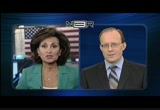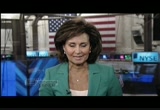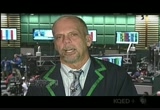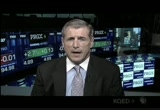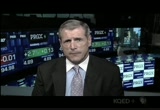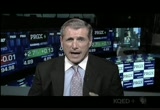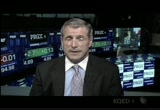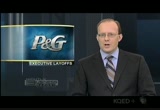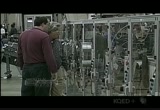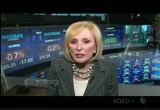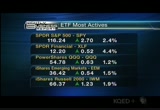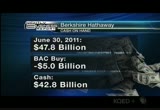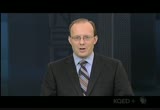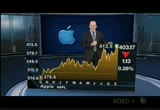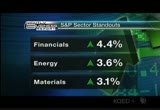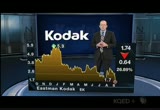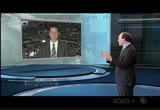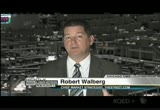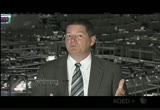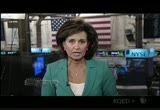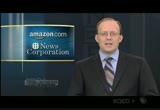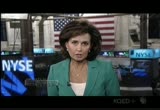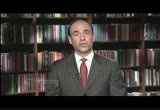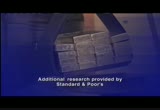tv Nightly Business Report PBS September 26, 2011 6:30pm-7:00pm PDT
6:30 pm
>> susie: stocks rally but gold continues to lose its shine, some see it as a buying opportunity. >> anybody who has not gotten into the gold market at this point, i think this is creating an excellent opportunity. >> tom: from precious metals to beaten down stocks, how best to invest in a volatile market. it's "nightly business report" for monday, september 26. this is "nightly business report" with susie gharib and tom hudson. "nightly business report" is made possible by:
6:31 pm
this program is made possible by contributions to your pbs station from viewers like you. captioning sponsored by wpbt >> susie: good evening everyone. a red-hot rally on wall street today as investors bought up stocks on hopes that europe could soon announce a big rescue plan. a lot of talk today, tom, about european countries voting in favor of a bigger bailout fund to deal with the debt crisis. >> tom: susie, that could go a long way to boost investor confidence, and that's why we saw the major stock averages move back into positive territory. the dow surged 272 points, closing above the 11,000 level again. the nasdaq rose 33 points and
6:32 pm
the s&p added 26. volume starting the week on the heavy side, just over a billion shares moving on the big board-- two billion on the nasdaq. but lots of focus as the meltdown continued in gold. prices tumbled more than 2.5% percent today, or $45, to under $1,600 an ounce. this is the lowest price in gold we've seen since july. >> susie: even though gold is below its record highs, many experts still expect the precious metal will soon shine again. erika miller reports. >> reporter: new yorkers who want to turn gold into cash come to 47th street. on wall street, the same trend is taking place, but for different reasons. as precious metals analyst joe foster explains, many investors are selling gold to cover losses in the stock market. >> investors, institutions-- especially in europe-- are needing to raise cash right now because of the debt crisis in europe and concerns about the economy. people are selling things that
6:33 pm
have been profitable for them. >> reporter: over the past decade, gold certainly has been profitable-- up from about $300 dollars an ounce to $1,600 now, a 450% increase. that's even including the harsh september selloff. >> reporter: the price of gold has fallen about 10% this month. the question many investors are asking is whether this is the bursting of the gold bubble or a golden opportunity to buy. >> anybody who has not gotten into the gold market at this point, i think this is creating an excellent opportunity. >> reporter: he thinks gold is headed to $2,000 an ounce, a 25% gain. but he says there are better bets than buying bullion. >> we like gold stocks. gold stocks have underperformed the metal this year. in fact, they've severely underperformed. despite their underperformance, the gold stocks are very very healthy. >> reporter: if you think it's been a tough month for gold, take a look at silver.
6:34 pm
the white metal has fallen twice as hard as the yellow one this month. gold and silver are often lumped together, but the two don't always trade in tandem because silver also has many industrial uses. trader anthony neglia thinks silver prices will remain weak even as gold rallies in the months ahead. >> silver, obviously wearing the industrial hat that it wears, has been lagging behind gold lately because of the issues that we've been having globally in europe, in china in japan and here in the united states. silver has a hard time warding >> reporter: if he's right, and silver prices head lower, there will be one upside for jewelry buyers on 47th street and elsewhere-- less expensive rings and necklaces this holiday season. erika miller, "nightly business report," new york. >> susie: joining us now, art hogan, managing director and strategist at lazard capital markets. hi, art, we have lots to talk about.
6:35 pm
>> we sure do, quite a day. >> susie: well, let's tart off-- start off by talking about europe. do you think that we'll see more rallies like we saw today? is the coast clear if europe does go away with this new rescue plan? >> well, susie, i don't know that the coast is clear, certainly. but i would characterize what we are getting both over this weekend and today is a hint of better news. and i certainly think that is what this market needs. we've been having a market that has really traded off of every utterance coming out of europe and it has been a frustrating three months. especially last week when we saw the precipitous sell-off last thursday. so to have a market get its arms wrapped around the fact that the european commission, the ecb, imf and g 20 have come up with a plan that's actually presentable and executable i think is exactly what this market is looking for to get some traction here. >> susie: and you're right, it has been a real nerve-racking couple of weeks that we've had. given that we are seeing some of these rallies, should investors buy into them or sell into them? >> well, susie, i think
6:36 pm
we've looked at this as very tight trading range. if you look at the s&p 500, for instance, we've really been in this sort of 10, 20, 11-20 marketplace where we sort of bounce off the 10,20 level and rally up around 1120, 1150. so we are at the at the lower end of that band. when you think about the producter implications of that, we have priced in a lot of bad news at this juncture. there is a larger possibility of more good news, than bad news. whatever the cost of rescuing greece, whatever the cost of getting our arms wrapped around a rescue package that gets funded and executed in europe, has probably been priced in. so i would say that we created several bargains in the marketplace and it's probably a better time not to be selling right now. >> susie: so are you saying about greece that if greece does default, are you saying that it's already been priced in so we won't see a major sell-off in the global markets? well, that's a great question. i think you have to look at this a couple of ways.
6:37 pm
if in fact greece does go through some sort of assault, it is largely depending on what is the magnitude of the haircut that is given to the folks that hold their debt. and i think that what's happening now, you know, the process is either trying to figure out exactly how we structure a greek default or how we structure a rescue package such that they don't have to. either way most of those outcomes are going to be something that the market has been waiting to hear, and while waiting to hear basically liquidating and we've seen more selling pressure over the last several months. so i would say that in large part if you look at some of the folks that have exposure to greek debt, greek sovereign debt like the european financials, we certainly see them pay the price for whatever that eventual cost is going to be in terms of market cap. >> susie: now you've been telling your clients there are a lot of bargains out there and we should take advantage of them. we're going to list two of the ones on your buy list, mcdonald's, m.c. d on the dow average and news corp. tell us why you like them and are these buy and hold
6:38 pm
kind of stocks? >> well, you know, it's hard to say anything is a real buy and hold but right now you look at mcdonald's as a very defense of play. they're the number one leader in the quick serve restaurant segment. they've done a great job of remodeling a lot of their stores that had gotten tired. they throw off a lot of cash. they are doing a great job of expanding into some of the emerging markets, the brick countries, so they've got that global exposure too faster economies. so i think it is a very defensive play and does well in the slow growth economy. >> susie: what about news corp. >> they just accident 58-- accidentally ran into something that caused they will to buy back a lot of their own shares it is low stock price after some news, the fastest growing publicly traded media company out there. by the way when they weren't able to buy bskyb they had an extra call it $10 billion to buy back their own shares. so if you look at the stock repurchase program going on, and extrapolate that over the next couple of years they could buy back a third of the outstanding shares alone. >> susie: we have to leave it there.
6:39 pm
any disclosures to make, do you own these stocks. >> i do not own either stock. thank you very much. >> susie: thank you very much. pleasure having you back. >> thank you. >> susie: we've been speaking with art hogan of lazard capital management. >> tom: still ahead, the "word on the street"? "buy." we'll have three stocks to buy now from strategist robert walberg of thestreet.com. >> tom: we've all heard about auto workers, construction workers and a lot of other workers being laid off, but now senior executives are the ones brushing off their resumes. proctor and gamble chairman bob mcdonald told the "financial times" the company has cut its vice chairmen from four to two and has shaved upper-level management by more than 10%. washington correspondent darren gersh takes a look at the growing trend of downsizing at the top. >> reporter: when consumers hear the name proctor and gamble, they think of clean clothes and dry babies. but when business leaders hear p&g, they think of a "talent academy," a company that has always put a lot of time and effort into training executives
6:40 pm
and future c.e.o.s. so when p&g trims group presidents and vice presidents, the signal is clear says syd finkelstein, a professor of management at dartmouth's tuck school of business. >> so if p&g is cutting back on senior executive talent, it really is a meaningful indicator, because of the intensity and effort they have spent for years and years on developing talent and enhancing their bench strength. >> reporter: executive recruiters say many businesses have already cut at the bottom of the ladder, so new savings will need to come from the executive suites. and with businesses sitting on cash, not expanding, there are fewer paths to advancement. executive recruiter george davis expects the job market for senior executives will get even tighter. >> companies are looking for growth through proven success, so there's going to be a lot of mergers, acquisitions. and with that, unfortunately, jobs get lost with the infamous synergy of any type of merger.
6:41 pm
>> reporter: still, some recruiters say this is a great time for companies to pick up new talent, but those who are hiring are cautious of taking on a big expense. influential headhunter janice ellig says some companies spend a year or more before bringing on a new senior executive. >> you want to make sure that that chief risk officer is the right person for your company. and that they weren't part of the problem where they were before, and that they were part of the solution. so there's a great due diligence on the part of the hiring company to make sure that they're hiring that talent. so its a much slower process. >> reporter: if executives want to keep their jobs or find new ones, they will have to do what most every worker must do to stay fresh. >> to think that you kind of know what you know at any point in time and you're done is probably a death sentence right now. you just got to keep learning and expanding and trying to enhance what you're adding to the company at all times. >> reporter: experts say the longer the economy remains soft, the higher up the corporate
6:42 pm
ladder the pain will be felt. darren gersh, "nightly business report," washington. >> susie: a big buy today for billionaire warren buffett. his berkshire hathaway launched a rare stock buyback. berkshire's board has authorized the company to repurchase an indefinite amount of stock and it is willing to pay up to 10% more than book value for the shares. as of june 30, berkshire's book value was $98,716 per class "a"
6:43 pm
share. so, the company could pay as much as $108,000 a share. the buyback comes just seven months after buffett told shareholders, "not a dime of cash has left berkshire for dividends or share repurchases during the past 40 years." berkshire has over $40 billion in cash on hand, even after last month's $5 billion investment in bank of america. but the company says it will halt any buybacks if its cash pile drops below $20 billion. berksihre hathaway "a" shares rose over $8,100 a share today to close at $108,449. motley fool senior analyst joe mayger owns berkshire stock and says at this price, the company offers investors a bargain. >> i think it's easy to read into this that buffett thinks that stocks at large are cheap. that said, he could have gone out and bought more stocks with that cash that he's got on the balance sheet, but i think that he looked at his own stock and said that this was the best investment at this time. and i agree.
6:44 pm
i think that the shares are a great buy right now. >> susie: it was a great day for warren buffett. tom, he earned nearly $3 billion on paper with today's 8% stock jump. >> tom: still, susie, berkshire "a" shares are down 10% so far this year. clearly he sees the bargain. the "b" shares were the strongest of the financial stocks in the s&p 500. strong broad-based buying today. let's take a look at tonight's "market focus." we saw a strong rally for u.s. stocks after last week's rout. it took a couple of hours before buyers got going. this is today's trading of the s&p 500. the low of the day came just after 10 a.m. when the government reported a drop in new home sales last month. the market ended near its high of the day thanks to rumors of a
6:45 pm
bigger bailout for europe. here's the past 90 sessions. while today's rally made up some of last week's drop, and that drop held above the august lows, the index is down 14% from its july high. among those stocks lagging the rally was apple. shares fell a fraction but for a time, the stock was below $400 a share. shares have been over $400 since hitting an all-time high a week ago. what's going on? an analyst at j.p. morgan following electronic manufacturing services in asia noted several ipad parts suppliers have lowered fourth- quarter orders by 25%. the bank's u.s.-based apple analyst did not change the forecast for ipad sales, a separate investment firm also highlighted a drop in ipad and iphone production, saying apple may be more cautious on overall global demand.
6:46 pm
one other item-- apple may see more competition this week. on wednesday, amazon.com is widely expected to roll out a tablet device to go against the ipad. amazon shares were up almost 3%. this was a new high. today's rally was broad-based. the financial sector gained almost 4.5%. much of the volatility has been fueled by banking stocks over worries about europe and the american economies. energy stocks caught a bid today as u.s. crude oil rebounded. and material stocks were back in favor after last week's commodity sell-off. erika highlighted the move in gold and silver earlier in the program. today's biggest commodity gainers included live cattle, up 2.5% over worries about supply. natural gas jumped more than 2% with warmer temperatures fueling higher electricity demand in the northeast and midwest. and corn bounced up 1.5% after hitting 10-week lows on friday.
6:47 pm
finally, a couple of household names saw sell-offs. clorox fell 4%. investor carl icahn dropped his effort to take over the company's board of directors. icahn had offered $80 per share to buy the firm. and eastman kodak fell hard, losing more than a quarter of its value-- down to a new 52- week low. the company is tapping into a credit line, re-igniting worries the company is having money troubles. and that's tonight's "market focus." >> susie: boeing shares reached skyward today, rising 4% to $6,200 a share as the jetmaker handed over the keys to the first of its 787 dreamliners. japan's "all nippon airways" was the lucky first customer. it plans to start flying the fuel-efficient wide-body jet in november. today's delivery is three years overdue, after the dreamliner was plagued by production and design problems. with over 800 hundred orders
6:48 pm
stacked up, boeing has an ambitious goal: building ten 787's every month by the end of 2013. >> tom: shrinking 401k balances and falling confidence in stocks, thanks to the market gyrations since july-- that probably describes the reality for many investors. that brings us to tonight's "word on the street," "buy." robert walberg is the chief market strategist at thestreet.com. bob, you've heard the complaints by exactly what wall street wants small investors to think with all this volatility. why consider buying stocks now. >> i think that say great point. we have seen a lot of the retail investors wash out in 2008 and again now with the very volatile marketplace. but as a retail investor this is an exceptionally good time to be looking to buy stocks, one the dividend yield versus ten year stocks is extraordinarily high and eval-- the valuations are compressed. even though the market has been down four or five months in a row and i think
6:49 pm
we could see it further based on europe, this is a really good time for investors to look at great long-term values in big names trading at very discounted prices. >> tom: the first one is caterpillar, the dow jones industrial component cat the ticker symbol. it road the commodity boom up through the springtime and has ridden it down here at a 52-week low or close to it. >> yeah, again i think are you looking at trying to time these investments. looking for selling where it is largely exhausted. caterpillar we might see weakness over the next one or two months but generally speaking i by the argument we are going to have a deep recession is overstated and i think as we look to the real number and see that we going to see a pickup in the economic numbers in the back half of this year, early part of next year, i think caterpillar will rally up, trading at good valuations. >> maybe with the background noise you can see it going on in downtown chicago. >> hewlett-packard is another one you are finding value. phq,-- hpq, talk about product problems or concerns about its computer business. and of course leadership
6:50 pm
questions. that stock has dropped like a rock. why catch this. >> i think it's everybody's favorite stock to hate. most people that hated it had has been sold. the valuations are so compelling for a company that has a great franchise. are you looking at valuations at i think .3 times sales and earnings of five times forward earnings. you know, with a dividend yield closing in on 2.5%. this is a stock that because of the all the baggage if you can buy it now, it is to the going to turn around immediately but the next 12 to 18 months somewhere between a 40 to 50% gain relatively easily. the new c.e.o. here is going to help get traction. >> tom: give us 30 seconds on best buy. this has been crushed because of concerns obviously over retail margins as well as the ability for the consumer to afford these electronic goods. >> again this is a stock i think is so overold, .18 times sale, priced for bankruptcy that is not in the picture. this is a stock that could double in the next 24 months and up 50% by christmas. >> how about disclosures.
6:51 pm
you can do w i don't own anything but caterpillar. caterpillar is owned by the portfolio. >> bob's article at the street.com a link on our web site as well. word on the street with bob walberg with thestreet.com. >> we are have breaking news from capitol hill, the senate has passed a temporary spending bill that will keep government agencies open and fund disaster aid to fema. the house passed a similar measure last week but that legislation was also offset by cuts to a government loan program for green auto manufacturing. current spending expires on friday. let's what we're watching for tomorrow: quarterly earnings from walgreen. we'll also see the lastest numbers on consumer confidence along with the s&p case shiller home price index for july. speaking of housing, we'll discuss ways to fix the industry with the c.e. of home builder toll brothers. new evidence today that the housing market is years away from a recovery. sales of new homes hit a six- month low in august. the commerce department says
6:52 pm
sales fell 2.3% to a seasonally adjusted annual rate of 295,000. that puts them on pace for the worst sales year since the government began keeping records 50 years ago. meantime, the median sales price fell nearly 8% to $209,000, the lowest price since last fall. >> tom: fans of "24," "the x- files," "buffy the vampire slayer" and other fox tv shows, will soon be able to watch them on amazon's instant streaming video service. it's part of deal the online firm announced today with news corp. it comes a day after rival netflix revealed it would stream dreamworks animated movies and specials. neither amazon or netflix disclosed the financial terms of the respective agreements.
6:53 pm
>> susie: with much debate in washington about jobs and job creation, many believe cutting the regulatory burden on american companies will help boost hiring. douglas holtz-eakin is one. he's president of the american action forum and former director of the congressional budget office. >> we hear a lot about regulations these days. you've probably even heard the president touting his regulatory reform efforts to remove outdated rules. what you probably haven't heard are the little-known facts on regulations, their cost and their impact on u.s. competitiveness. what are the costs? we're projected to end 2011 with $108 billion in new and proposed
6:54 pm
regulatory burdens, and that doesn't include net neutrality rules that linger in regulatory limbo because of white house politics, and it doesn't include greenhouse gas regs for and dodd-frank? regulators have hardly started. regulators pumped out more than 82,000 pages in 2010 and were on pace to eclipse 80,000 this year. this translates into 8.8 billion hours of paperwork, up from 7.4 billion hours in 2000. these aren't just a set of numbers; they translate into real impacts on our economy. e.p.a. estimates that just two of its rules could end 48,000 jobs, raise electricity prices by more than $8.4 billion and these increasing prices, at a time when natural gas is historically cheap, will serve only to decrease american exports, a result that betrays the president's own goals. this isn't a productive use of our regulatory state. the president wants you to believe that his regulations are worth the diminished prosperity. i disagree. economically, regulations act just like taxes, only you won't see them in the budget. we can have sensible protections for public health and safety that don't destroy american jobs
6:55 pm
and harm u.s. competitiveness. we just need the president's actions-- legislating through a bureaucracy-- to match his words-- the importance of sustainable growth. i'm doug holtz-eakin. >> tom: just a reminder: you catch us online at n.b.r. on pbs.org. there you'll find all the market data from the program, and you can watch any programs you may have missed. you can also follow us on twitter, @biz report, or my personal feed, @hudsonnbr. if tweeting isn't your thing, "friend" us on facebook at bizrpt. and finally, what was once >> tom: that's "nightly business report" for monday, september 26. i'm tom hudson. good night everyone and good night to you too, susie. >> susie: good night tom. i'm susie gharib. good night everyone. we hope to see all of you again tomorrow night. "nightly business report" is made possible by: this program was made possible by contributions to your pbs station from viewers like you.
6:56 pm
131 Views
Uploaded by TV Archive on

 Live Music Archive
Live Music Archive Librivox Free Audio
Librivox Free Audio Metropolitan Museum
Metropolitan Museum Cleveland Museum of Art
Cleveland Museum of Art Internet Arcade
Internet Arcade Console Living Room
Console Living Room Books to Borrow
Books to Borrow Open Library
Open Library TV News
TV News Understanding 9/11
Understanding 9/11
